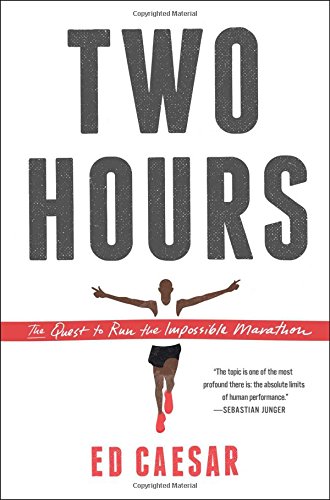
Two Hours
The Quest to Run the Impossible Marathon
کتاب های مرتبط
- اطلاعات
- نقد و بررسی
- دیدگاه کاربران
نقد و بررسی

September 28, 2015
Debut author Caesar, a journalist and war correspondent, explores the world of elite marathon running and what it will take for someone to crack the two-hour barrier. Using the tale of champion Kenyan long distance runner Geoffrey Mutai as the through-story that holds the book together, Caesar jumps around, covering the origin and history of the 26.3-mile race, the science of long-distance running, and the role athletic shoe companies may play in an athlete achieving this record-breaking goal. Much of the book focuses on a tiny section of Africa where the best marathoners in the worldâincluding Mutaiâcome from. Caesar, who has reported widely from Africa, does great work capturing the lives, training routines, and proud ancestry of these amazing runners, not to mention the pitfalls and dangers they face before and after they achieve fame. This strong tale covers the joys of athletic triumph and the pain of missed opportunities, whileinvestigating what it means to be born or bred a champion and what it will take to for someone to make running history. Caesar proves himself an engaging storyteller with a book whose time has come.

September 1, 2015
Journalist Caesar's debut lacks focus. Is it about marathoner Geoffrey Mutai, or is it about the possibility of running a marathon in two hours or less? Or is it, in fact, about both of these topics while also being a compact history of marathon running? The author spends too much time hopping back and forth between these related subjects. Curiously, the book's most interesting section is on the history of distance running, particularly the pedestrian (a catchall term for a combination of running and walking) craze of the mid- to late 19th century. His summary of the science behind why certain groups of people, Kenyans in particular, run faster than others is also well done. What we learn about Mutai and other runners, however, is generally uninspiring. Readers will not come away from this book knowing much more about what makes these men tick than when they first opened it. VERDICT Though the books are different in intent, readers might want to try David Epstein's The Sports Gene or Christopher McDougall's Born To Run.--Derek Sanderson, Mount Saint Mary Coll. Lib., Newburgh, NY
Copyright 2015 Library Journal, LLC Used with permission.

September 1, 2015
In the same way that the four-minute mile, once thought impossible, was shattered, runners and fans of the sport of running are now determining whether a marathon (of 26 miles, 385 yards) can be run in under two hours. Although record-keeping is less than exact (marathon courses vary in configuration, surfaces, and so on), the current best is just under 2 hours 3 minutes. Caesar is a young journalist who has immersed himself in the complex, often secretive, and, to some, utterly unfathomable sport of professional city marathoning and its history. He has interviewed and, at least to some degree, gotten inside the remarkable psyches of the world-class runners, nearly all of them East African (Ethiopian and Kenyan), who have been steadily lowering the standard, centering on the engaging Geoffrey Mutai. Genetics and drugs are discussed knowingly. Optimistic experts see two hours being bested within a few years; others more pessimistically think it may wait until the 2030s. But even high-schoolers have now run four-minute miles, and institutions and businesses with a special interest labor to promote sub-two efforts. It's only a matter of time.(Reprinted with permission of Booklist, copyright 2015, American Library Association.)

























دیدگاه کاربران